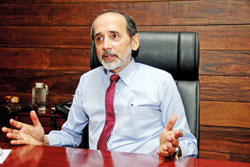Killer bureaucracy impedes tea exports

Rohan Pethiyagoda Sri Lanka Tea Board (SLTB) Chairman
Sri Lanka’s government sector is steeped in bureaucracy so much so that its repercussions on the economy spell delays and setbacks, particularly for tea exporters who have been adversely impacted.
President Maithripala Sirisena’s own admission that the bureaucratic machinery that causes delay should be overlooked at a time of crisis clearly highlights the problems encountered in the current structure of the government service, Sri Lanka Tea Board (SLTB) Chairman Rohan Pethiyagoda told the Business Times last week.
For instance, he explained the need of a four wheel drive vehicle for the Tea Commissioner, an officer who has to visit the factories, requires approval from a number of officials and the Cabinet as well. However, the request was declined due to the fact that the said officer was allocated a different vehicle, a car, as stipulated in the rules and regulations of the state service.
Mr. Pethiyagoda was also critical of government measures to bar chairmen of state institutions from embarking on more than two foreign trips per year as per the new decision taken by the state about two months back. “Any wrongdoer should be fired, but don’t have rules that slow down the people,” the Chairman asserted.
Moreover, he pointed out that red tape at the SLTB directly impacts tea exporters who are compelled to send their teas to the board for testing and the laboratories for analysis. Tea culture testing takes seven days; it was explained but since there were no staff present on Saturdays and Sundays this test would have to be repeated. This eventually results in delays in exports with containers held up for up to three months. But in this regard, the authorities have taken measures to rectify the issue by employing the services of other state-run laboratories which could be used for these tests to ensure exporters would not have to be burdened with delays.
Mr. Pethiyagoda explained that their laboratory staff was paid only one – twentieth of their salary when working on off-days as a result they were not motivated enough to attend to work on these holidays. This issue would be taken up with at Cabinet level to ensure that the government system does not delay exporters. This type of red tape has also impacted the very long awaited tea promotional campaign which would initially be carried out as a digital marketing campaign.
The SLTB noted that while Facebook and other social media sites accept payments via credit cards, the maximum credit limit on government cards is Rs.100,000 while approvals are needed from the Treasury to change it to between Rs.1 – 1.5 million. In addition, the Controller of Exchange has stated that the (state) credit cards cannot be used for commercial transactions.
Moreover, Mr. Pethiyagoda explained that hiring and firing is also carried out according to stringent government regulations that do not allow a person to be hired until the last person in that posting has left the building. And when a new person needs to be hired, a number of written approvals must be obtained to employ a new entrant causing delays and setbacks in a system that requires a smooth and constant flow of work.
| Govt. seals prospects of blending teas | |
| Lack of consensus on allowing blending of imported teas with Ceylon tea has forced a high-level committee appointed to study this issue to temporarily suspend the process. Sri Lanka Tea Board (SLTB) Chairman Rohan Pethiyagoda who also heads the committee pointed out that there was no consensus among the committee members and as a result blending of foreign teas with local origin teas would continue to be disallowed in Sri Lanka. The need for a policy on this issue arose as a result of numerous requests made to the Minister of Plantation Industries and the SLTB by the Tea Exporters’ Association, and specific requests by Ahmad Tea and Tetley expressing an interest in establishing bagging and packaging facilities within a Board of Investment Free Trade Zone environment in Sri Lanka. He noted if Sri Lanka allows a blending hub then tea goes as a multi origin tea packed in Sri Lanka and in the mind of the consumer in foreign countries could in some way damage the Ceylon Tea brand, The fear also arises if the people may think that importing tea from other origin to blend in Sri Lanka could eventually enter the country and if this could be sent to the auctions as Ceylon Tea, Mr. Pethiyagoda explained. Despite the high profit margins that could be gained by exporters the fear of losing the quality standards set high by the Ceylon Tea brand has resulted in the state authorities refraining from taking a decision on allowing blending of foreign teas with local teas in Sri Lanka. Sri Lanka has placed restrictions only on the import of orthodox teas but has allowed exporters to import any other teas for bagging and re-exporting in value added tea. |


